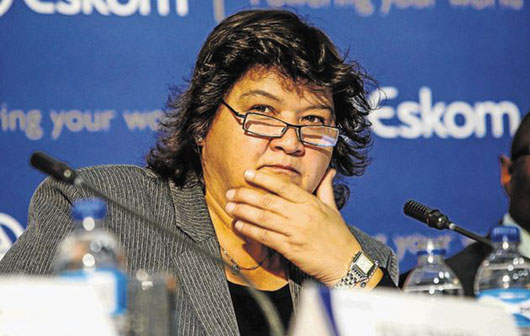
CAPE TOWN — Seven countries in Southern Africa have power agreements with South Africa’s power monopoly Eskom, but Zimbabwe and Zambia could have their power supply interrupted, Public Enterprises minister Lynne Brown has told MPs.
In a written reply to TR Majola, a DA MP, who asked about Eskom’s agreements with countries in the Southern African Power Pool relating to the importation and exportation of electricity which are firm or non-firm agreements, Brown said Eskom has power purchase agreements or power sales agreements with various entities in the seven countries in the pool.
The firm agreements are those that could not be interrupted and the non-firm were those where energy is supplied as and when it is available, and these are subject to interruption.
Thus, if South Africa suffered load-shedding, then Zimbabwe and Zambia could have their power interrupted.
In terms of Mozambique, South Africa has four agreements with its power entities. There are firm agreements with Cahora Bassa, the Mozambique Transmission Company and with Aggreko.

These are a power purchase agreement, a power sales agreement and a power purchase agreement respectively. However, in the case of the Electricidade de Mocambique, the power sales agreement is a non-firm agreement. A power sales agreement applies to The Swaziland Electricity Company and it is “firm”, Brown said.
A power sales agreement and a power purchase agreement apply to the Lesotho Electricity Company and they are also firm, she reported.
There is a power sales agreement with the Botswana Power Corporation which is also firm while with Namibia there are firm power sales agreement with Nampower, Skorpion Zinc Mine and the Orange River Crossing.
- Chamisa under fire over US$120K donation
- Mavhunga puts DeMbare into Chibuku quarterfinals
- Pension funds bet on Cabora Bassa oilfields
- Councils defy govt fire tender directive
Keep Reading
Brown said the principles that apply to supply agreements during emergencies include that trading partners are required to utilise all their own generation capacity to the maximum and all non-firm energy supplies are reduced to zero before moving into load curtailment.
In addition, all firm energy supplies are reduced by 10% when there is a load curtailment imposed on South African customers.
“Trading partners are required to enforce the 10% reduce on their customer base,” the minister reported.
If there is load shedding in South Africa “then all sales to Namibia and Botswana are withdrawn, and Swaziland and Lesotho are required to do proportional load-shedding”.
Energy which may inadvertently be drawn out of the Eskom system is charged at punitive emergency generation rates, she reported.
— Fin24










